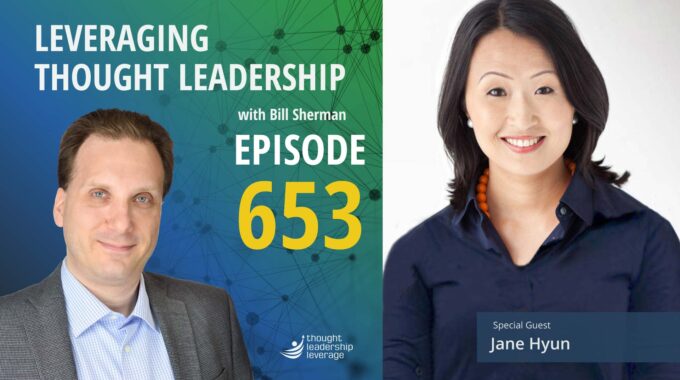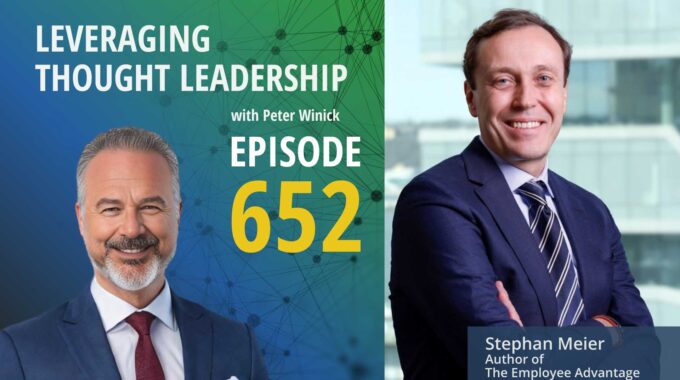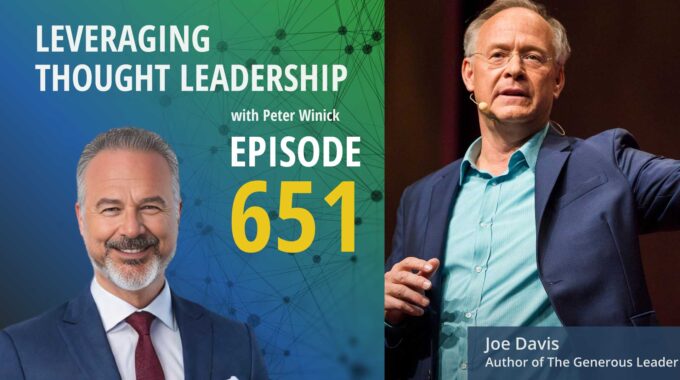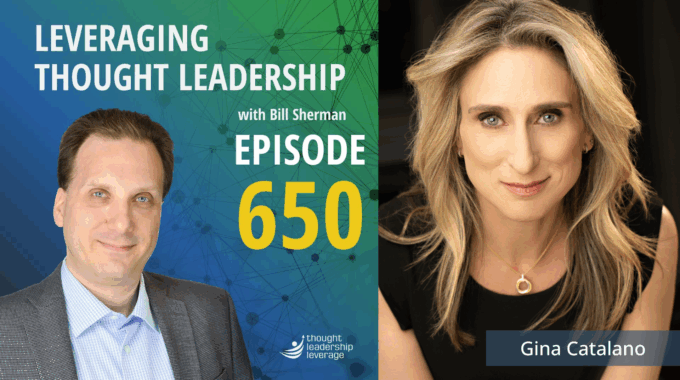The Hidden Barrier to Engagement and How to Break Through This episode unpacks how cultural…
From Refugee to PhD | Dr. Pradeepkumar Sacitharan
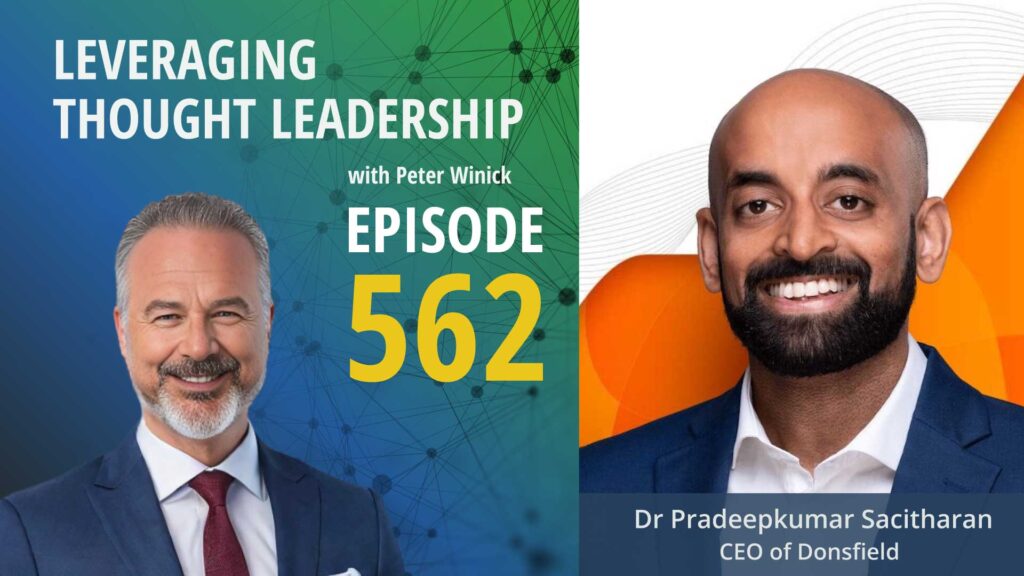
Practical Advice for Thriving in Today’s Leadership Landscape
A conversation with Dr. Pradeepkumar Sacitharan about resilience, setting historic goals, and how everything is a sales game.
Welcome to another insightful episode of Leveraging Thought Leadership with your host, Peter Winick. Today, we are honored to have Dr. Pradeepkumar Sacitharan, the CEO of Donsfield, a distinguished global business and trade development firm dedicated to empowering individuals and organizations to expand and reach their full potential. Dr. Sacitharan is also the author of “99 Trillion Helpers To Improve Your Gut Health: How to Boost Your Metabolism, Productivity, And General Wellbeing in as Little as a Month Without Popping any Pills,” a groundbreaking book that explores the transformative power of gut health on overall wellness.
Join us as Pradeep shares his remarkable journey of resilience and triumph, from being a war refugee smuggled into London by his brave mother to navigating the challenges of growing up in social housing surrounded by gangs. Despite facing adversity, including a serious gang fight that left him in a coma, Dr. Sacitharan remained determined to change his life trajectory. Through sheer perseverance and an unwavering commitment to self-improvement, he embarked on a path of education and discovery that ultimately led him to Oxford and Harvard, catalyzing his thinking on the world and what is possible.
Dr. Sacitharan’s journey is a testament to the power of resilience, determination, and the transformative potential of education. From dropping out of high school at 16 to becoming an associate professor and VP of Development in Biotech, he defied the odds and carved out a path to success that few could have imagined. His story serves as an inspiration to individuals from all walks of life, demonstrating that with passion, perseverance, and grit, anything is possible.
As a thought leader and visionary entrepreneur, Dr. Sacitharan is driven by a singular mission: to be of service to his species and inspire the next generation to reach new heights. Pradeep shares invaluable insights on the importance of emotional drive, setting bold goals, and the fundamental role of sales in every aspect of life. From overcoming personal and professional hardships to navigating the complexities of the business world, his wisdom and experience offer invaluable lessons for aspiring thought leaders and entrepreneurs alike.
Join us as we delve into the mind of Dr. Pradeepkumar Sacitharan and discover the secrets to unlocking your full potential and making a lasting impact in the world. If you want to set bold goals for your own career or business but are not sure where to start reach out to Peter Winick, CEO of Thought Leadership Leverage to discuss what strategies we can provide to propel you forward.
Three Key Takeaways:
- Resilience and Determination: Dr. Pradeepkumar Sacitharan’s journey from being a war refugee to a successful entrepreneur underscores the importance of resilience and determination in overcoming adversity and achieving one’s goals.
- Emotional Drive and Purpose: The episode highlights the significance of emotional drive and purpose in fueling personal and professional success. Dr. Sacitharan emphasizes the importance of identifying what emotionally drives you and using that passion to fuel your journey toward your goals.
- Sales as a Fundamental Skill: Dr. Sacitharan discusses the role of sales in every aspect of life, from personal relationships to professional endeavors. He stresses the importance of developing strong sales skills and emphasizes that salesmanship is essential for building meaningful connections and achieving success in today’s world.
If you need a strategy to bring your thought leadership to market, Thought Leadership Leverage can assist you! Contact us for more information. In addition, we can help you implement marketing, research, and sales. Let us help you so you can devote yourself to what you do best.

Transcript
Peter Winick And welcome, welcome, welcome. This is Peter Winick. I’m the founder and CEO at Thought Leadership Leverage. And you’re joining us on the podcast today, which is Leveraging Thought Leadership. Today my guest is Doctor Pradeepkumar Sacitharan. If I got that right, my day is going to go well. Did I get it?
Pradeepkumar Sacitharan The day is going to go very well.
Peter Winick Awesome. Okay. That was that was the part I was most nervous about. Let me give you a little bit of a bio here. He’s a global e-commerce expert. He’s the CEO of Donsfield. He’s got a PhD from the University of Oxford in molecular and cellular medicine, Fulbright scholar at Harvard, and he’s gained international business networks and was the VP of development for a leading global biotech company. We can go on and on and on, but let’s just dive in and hear his story. So you and I had an interesting chat a couple of weeks ago, and you gave me a brief version of your really interesting story. Why don’t we start there? Because I always I’m always fascinated by how someone gets to where they are as a thought leader. And yours was clearly a really interesting story. So give us the condensed version of, of your world.
Pradeepkumar Sacitharan Yeah, I get these. Well, first of all, thank you very much for this wonderful opportunity. So I get these podcast requests and we send them out as well, because my way of giving back. Yeah, it’s been an interesting story to break it down. I know, I know, we only have 20 minutes, essentially. I was a war refugee smuggled on a plane by my mother, brave mother, into London, grew up in social housing because that’s the only kind of housing we got surrounded by gangs, learned a lot on the streets. Fortunately to me, I didn’t get into any legal troubles. Well, I go into a lot of fights. Took up semi-pro weightlifting. Was not quite gifted enough to go to the Olympics, but weightlifting kept me disciplined. Dropped out of high school at 16, and I just done sales. So live from 16 to 21. Was sales and weightlifting go into a serious gang fight at 21. Found myself in a full out coma, and I said Hey Pardeep, I woke up alone in a hospital bed and my something’s got to give. So, I just made phone calls. Sales. Right. Phone calls? Three phone calls. Small community college. They’re like, come on in, kid. Then I was like, oh, crap, I can really do science because I knew muscle biology, right? I fell in love with it. And I said, obsessive. I always talk about obsessions. Then another 13 phone calls into Imperial College. Now the 47 phone calls, an application going to Oxford. Oxford, I loved it. Won a national prizes. Discovered drugs. And then I went to Harvard and I was like, hey, this is great. Then knocked on my professor’s door. I said, hey, can I have 300 million? Because I think I had three ideas for these drugs. They’re like, right. It doesn’t work like that kid. So for that early journey about sales, I always say life is three things a sales game, a numbers game, and a risk game. So that early life and that journey coming from a dropout to Oxford and Harvard really catalyzed my thinking on the world and what’s possible. Right. So then I thought, okay, even Nobel Prize winners are constrained by the data constructs of their life. So I said, hey, look at these professors. They want me to work for 30 years. I said, no chance. So I’m broke again. I will travel the world. Went to Paris. Sorbonne. Went to Jerusalem. Learn from the best people. Came back to the West. And I said, hey, can I have 300 million? That like, no kid, it doesn’t work like that. You need ten more years. So I made a sales game, right? Numbers game. Still that got that street mentality. Now I’ve got the Oxford and Harvard mentality as well. So I made 272 phone calls. One guy picked up in China, he’s like, come on over. So I landed in China 18 months after my PhD, became associate professor, got my lab, discovered the three drugs my professors in the West said would take 30 years in 18 months. And then someone recruited me for VP for business development in biotech as third year VP, and associate professor. So in nine years from dropout, I achieved all this. I’m like, whoa, the sky’s the limit if you really tap into real thinking and thought leadership. So at that time, I had a global community, a global, leadership position. And then the pandemic hit, and I came back to the West and I said, can I have the same job? Nope. You’re too young and overqualified now I like crap. So, I started hustling for eight months, didn’t get a job at the same level. So, I started my e-commerce, became very successful on Amazon and e-commerce. Use that money now to leverage into higher level commodities. So now a kid from northwest London, don’t tell me how I’m trading in commodities metals in, fuels oil. Still doing e-commerce and really building a business conglomerate for me. That’s why I want the legacy and then leverage that. So, it’s really been crazy life.
Peter Winick Yeah. It’s been a… So I love the fact that the grit, the determination. You know, it’s one thing to go out and cold call when you have nothing from an educational perspective, etc. it’s another thing to continue to do it once you’ve got the PhD and the Harvard degree. I think a lot of folks that come from that sort of the traditional path, they’re. Don’t have that grit and that cold call. And that’s a general statement. And I know that’s not universally true. Give me a sense of the underlying thought leadership, because there’s lots of different things that you’ve gone after that you’ve succeeded in, from e-commerce to chemistry, in the medical and all that. But give me a sense of what is the underlying thought leadership underlying message that has driven you.
Pradeepkumar Sacitharan How useful can I be to my species? And how can I use this journey to really turn on the key for the next generation? So legacy is not who or what you leave behind or what, but the bar you set behind so they can raise the bar. That’s true legacy. Now I’ve got students, I’ve got employees. I eventually will have kids as well. So what? What is it? How will you go to really inspire the next generation? Leave the legacies. And also, I wanted to tell you something that there’s two thoughts here that opposing there’s a street hustler and there’s this Oxford Harvard. Right. And I always talk about egos and identities.
Peter Winick Yeah.
Pradeepkumar Sacitharan The ego the ego is good. And I tell people, use your ego. The ego is like a skin. You can’t get rid of it. So, you should know yourself very well and know what you are. But the identity is like the clothes you put on and that ever changing.
Peter Winick So stay there for a second, because I think that, you know, there’s a whole bunch of expressions. I’m sure some of you know, you can take the kid out of Brooklyn, but you can’t take the Brooklyn out of the kid, that kind of thing. Right? So, I think that that hustle, whether it’s developed, or it comes out of literal necessity, out of survival, right. Give someone an advantage that that same person with the pedigree, with the identity, with the PhD and all that wouldn’t have. And I think it would be easier for you at this stage of your life to say, I don’t need to hustle anymore. I’ve got a brilliant education. I’ve gone to some of the best institutions in the world. I’m incredibly successful. But how is it that you haven’t lost it? How is it that it’s still such a part of who you are and what you do?
Pradeepkumar Sacitharan It’s who I am. I’m driven for greatness. And. I tell this to people. The studies show that if you’re born into successful family, you are more likely to be successful, right? You can’t argue against that. So this notion of, you know, they say if you suffer the Hollywood notion that you become better, it doesn’t work like that. I think it’s individualistic. It’s who you are and you to realize your talent. I tell you, why.
Peter Winick Wait. But when you say that when you’re born into a successful situation, family, zip code, economic status, whatever, it helps to be successful. And yes, the data bears that out. But when it comes to resiliency, overcoming obstacles, coming back from horrific personal and professional issues, I haven’t seen any data that shows that, have you?
Pradeepkumar Sacitharan No, I haven’t, but I think it’s highly individualized and you really need to work out who you are and how you can utilize your talents and what the purposes of you doing it. If you don’t, you’re just another number. And I’ll tell you why. A counter argument and they say, oh, you’re not standing up for your life story. I’m like, no, I’m standing up for the truth because 99% of this world lives on, what, less than $10 or whatever the figure is, right? So how come 99% of the world are not driven for greatness? The end number doesn’t match up. And then they say, no, no, you’re in the US or UK opportunity to say, okay, let’s break it down. The US and UK, 97% or 99% of the population are not in the top 1%, earning 500,000 more. How come there’s no hustle mentality in all of those individuals? So it’s truly down to the data constructs you have, the individual nature and how you utilize that talent and what you find out and how you truly reflect on your purpose. So there’s something driven in me. I’m not saying I’m special, like the ability to just say, hey, now is this time, now is this time. I want to keep going.
Peter Winick If you’re enjoying this episode of Leveraging Thought Leadership, please make sure to subscribe. If you’d like to help spread the word about our podcast, please leave a five-star review at ratethispodcast.com/ltl and share it with your friends. We’re available on Apple Podcasts and on all major listening apps as well as at thought leadership leverage.com/podcast.
Peter Winick But But stay there. Is that a capability that can be developed? If I say, you know what, I’d like some of that grit, right? Like I’d like some of what he’s got. But, you know, I’d rather not. I could if I could avoid the suffering piece. That would be nice too. How do I develop that?
Pradeepkumar Sacitharan So it comes down to I just had a brilliant executive talk to a couple of board members. I think I always used to say in China and everywhere, you can’t, you can’t expect passion, expect to pay, right? Because you can’t get people to actually do certain things. So, you need emotional drive. And we in the West talk a lot about logic, but you really need emotional drive. Emotional drive if the purpose is right get you up and going. So the emotional fuel is very important, and you need to find that.
Peter Winick How is that different than intrinsic motivation, what you’re calling emotional drive. Because there’s a whole thing.
Pradeepkumar Sacitharan Thing that has to be intrinsic okay. And we separate the two. But I think it’s absolutely physiologically important and psychologically important as well to get the emotional drive. It’s absolutely imperative. And by the way, I think the Western kind of thought leadership have heavily depends on the kind of intellect, and also soft skills and so forth. But there’s an intrinsic holistic kind of spiritual way that we forgot, I think, and that we need to incorporate.
Peter Winick Well, I mean, you made a comment a few moments ago about, you know, part of your thought leadership where your focus is around making the species better. That’s a big, big, you know, bag, as they would say, right. Like that’s a that’s a big goal, probably one that would never be accomplished to the nth degree. Right. You know, it could be it’s a relative peace.
Pradeepkumar Sacitharan I do agree.
Peter Winick How do you measure your progress against that? Because if you have a goal that says, I want to do, you know, whatever, I’m running a business and I want it to do 3% better Q2 than it did Q1. That’s easy. You look at the numbers, you did it. You didn’t. You missed it. You didn’t do some analysis. How do you know you’re making the species better.
Pradeepkumar Sacitharan Bold historic goals. So when I went to Oxford, I didn’t want to go to Oxford or Harvard. I wanted three Nobel Prizes. They’re like, what’s wrong with you? They’re like, well, I said, very curious to I when I tried to go to the Olympics, I didn’t want five gold. I wanted six gold medals. Never going to the…
Peter Winick Olympics or the Olympics are a clearly a competitive arena.
Pradeepkumar Sacitharan Stories. Nobel Prize winning. Right. I never got there. But I you know, it’s the old saying, if you aim for the moon, you land in the stars, you will never surpass your wildest expectations and your goals. So, it has to be bold and historic. And if you set them high, you’re not deluded. You are actually going to make sure you want to achieve more than you want to achieve. And coming back to the actual piece, no matter what you do, if you hit Q2, Q3, whatever, even in a local level, national level, international, you’re serving people, you’re serving your customer. So, if you’re not doing that is a holistic approach, is actually making the species better or serving in some way.
Peter Winick Got it. You spent a good amount of time earlier in our conversation talking about sales, sales and sales, and it’s so interesting to me in that in my work with authors and thought leaders and speakers and academics, I would say north of 90% of them, the area they struggle the most with is the business side of the house. They’re really good at the research, at developing the thought leadership and writing and speaking and all those things that scare a lot of people. But when it comes to sales, marketing, distribution, business development, you know, cold calling, whatever it is, it’s not how they’re wired. And and that’s number one. And even when they go to try it, it makes them feel uncomfortable. It makes them feel like I’m, you know, I’m too smart to have to be doing this. You don’t get a PhD in sales from Oxford, you know. So embrace that a little bit because I think that might shake some folks out of the trance that, you know, if you don’t sell, you don’t eat.
Pradeepkumar Sacitharan You know, you don’t. And everything’s a sales game, right? Everything you do is a sales game. Even if you’re going to sell to, you know, you’re going to get a good-looking woman or a man or dating or hooking up in a bar or, you know, I don’t know, proposing an interview or your sales, say, and even know how to conversation. They’re even meeting someone in terms of passing a message on everything that you see around has been sold to you, or idea has been sold as a concept to you. So everything sells fundamentally. And what you can’t do. I think we’ve looked upon salespeople badly. There’s a connotation. But really, if we have a philosophical nature, I think it makes you better. And this is why it makes you better. Because if you can sell to the world, you can relate to the world. That means you’re actually automatically a better person. If you can sell to the world, you relate to the world.
Peter Winick I, I agree with that. And then if you look at what’s going on in the domain of sales, so much emphasis on eye on sales or automation on, you know, because there’s so many tools that we can use to find the right prospect. Yeah. Yeah. Great. The right copy, you know, automate, automate, automate, which is great as a tool. But at the end of the day, not in all things, but in many, many things. The things that are harder are things like trust, like empathy, like listening skills, like social skill, etc., which I don’t care what chat GPT you’re using, it’s not going to tell you, you know, can you show me how to feign empathy?
Pradeepkumar Sacitharan You know, you can’t I think no automation. Again, you can only do what you can do and it will be important. But really the face value up front is very important. People. I still fly to meetings to get to know people. People still fly into London to meet me because you need that connection. I don’t see how it’s going to differ. I really don’t see how it’s going to differ.
Peter Winick Now. Now there’s a relative. You know nature to that assumption, right? If I’m selling some nominal, service or whatever. It’s illogical for me to fly halfway around the world to sell something that’s worth $1,000 or something like that.
Pradeepkumar Sacitharan No, no, it’s ROI. Right? And you engage that and you do that. But I don’t think you can beat it. And what allows in person is you can’t divert what I call the pattern recognition of our species evolution. God, whatever we evolved in a way, or made in a way to recognize patterns and recognize safety and not safety, common traits and so forth, that kind of eek! What I call skew spiritual quota is only available in person, and you can’t kind of let the intellect or IQ deal with that.
Peter Winick So I’m give you an opportunity now to talk to maybe you 15, 20 years ago. There are folks out there now that are, you know, similar to you. Maybe they came from, you know, the wrong side of the tracks, unfortunate situations. I doubt they’re war refugees. There’s not as many but unfortunate circumstances. Right. But they’re smart, they’re gritty, they’re persistent. What is it that you would ask of them or advise them as it relates to thought leadership? Because it might be the furthest thing from their mind when you’re in that survival mode to be thinking about this sort of abstract, intellectual thought leadership. Right. Like what? How would you how would you counsel them?
Pradeepkumar Sacitharan So work out what comes easiest to you. Look around. Do compare yourself. What becomes easiest to you? What does emotionally drive you in terms of subject? Then go out there and those two get a sales job in those two overlapping areas, and just be the best salesperson there is. If it’s a free job, if it’s not, that’s fine. If it’s education, go for education. And when you’re in that position, have lofty, crazy goals and go after those and break them down and just, you know, do it, just do it and then pivot if you have to, if it’s not working.
Peter Winick Got it. And what that will teach you is what? How to communicate better, how to relate better, what’s the other side of that. So, let’s say I did that for a year, and I knocked all my goals out. What is it? What is it that I’ve benefited other than learning a skill and generating revenue during that time.
Pradeepkumar Sacitharan We get immense self-esteem and confidence. You look in the mirror and say, I don’t know if I could swear in this podcast or…
Peter Winick Sure go for it. What the hell.
Pradeepkumar Sacitharan I say I’m fucking great. Like it gives you immense esteem and confidence. And that’s the most important thing because you tick off those small goals, medium goals, long terms. I’m like, oh my God, if I can do all this, what? Imagine what else I can do. And also, it allows you to have a very thick skin. You know, people laugh at me. They’re like, why you phoning cold, calling banks, trying to get international banking transactions. And I’m like, I’m still hustling. I’m doing it because I’m so thick skinned that you can laugh at me. You can call me deluded, but I’ve achieved so much and you relate back to your achievements. You’re like, oh, I can nail this. You can, you can do it.
Peter Winick So this has been great. I appreciate your time. Amazing story, amazing accomplishments. Thank you for spending some time with us today. Pretty. But appreciate it any time.
Pradeepkumar Sacitharan Thank you so much.
Peter Winick To learn more about Thought Leadership Leverage, please visit our website at ThoughtLeadershipLeverage.com to reach me directly. Feel free to email me at Peter at ThoughtLeadershipLeverage.com, and please subscribe to Leveraging Thought Leadership on iTunes or your favorite podcast app to get your weekly episode automatically.


